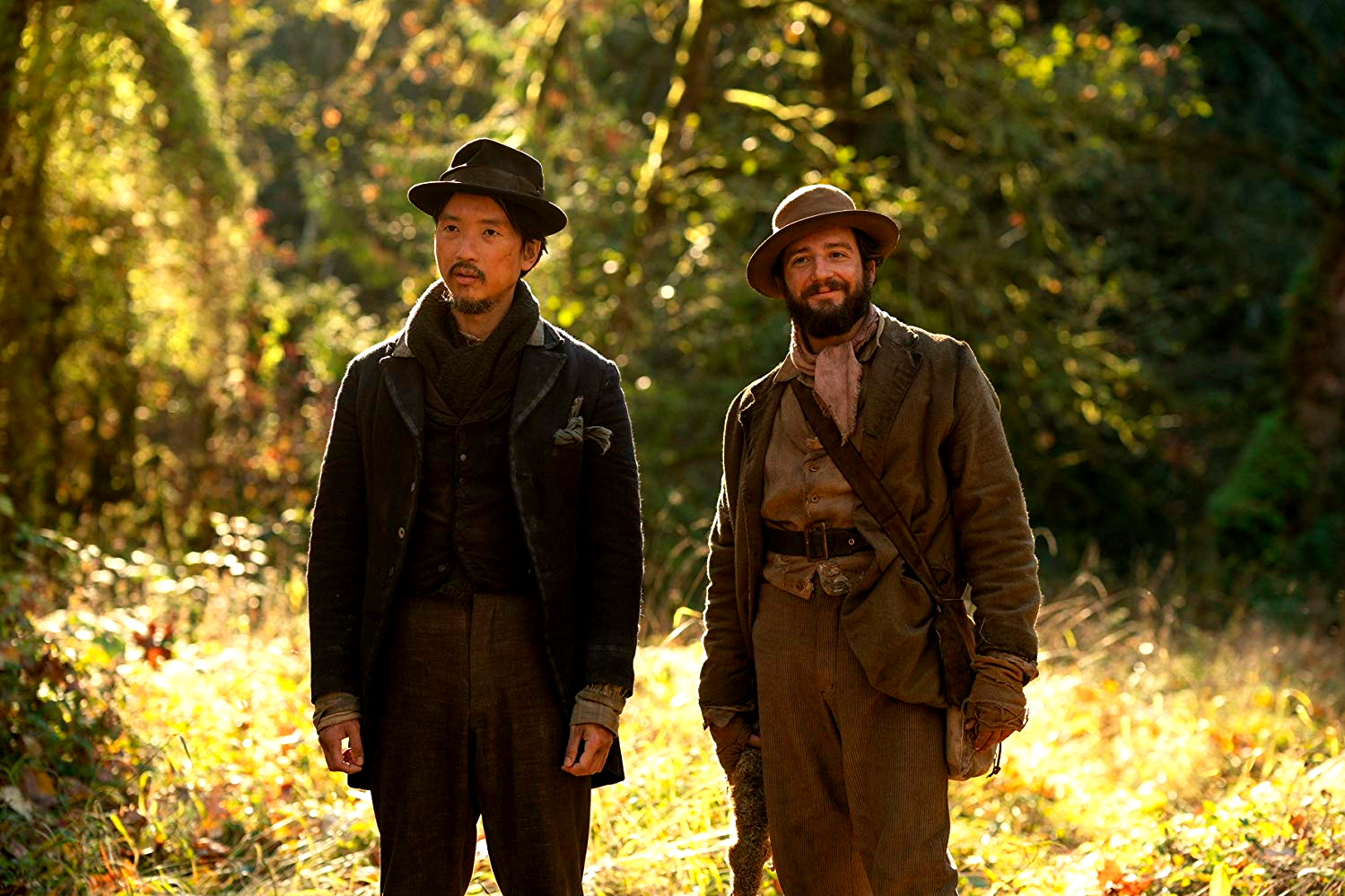First Cow is a necessary portrait of platonic male affection
This film offers a glimpse at what manhood looked like two centuries ago


A free daily email with the biggest news stories of the day – and the best features from TheWeek.com
You are now subscribed
Your newsletter sign-up was successful
First Cow opens with lovely poetry from William Blake: "The bird a nest, the spider a web, man friendship." The line precedes the film's opening sequence, where an unnamed woman (Alia Shawkat) and her dog (because what would a Kelly Reichardt production be without a dog?) stumble upon and unearth a pair of human skeletons buried a stone's throw from a rivershore in modern day Oregon. Blake's words take on dual meaning: Friendship might be home and hearth for man, but it's also his tomb.
Given that the bones belong to 1800s frontiersmen who'd rather be anywhere than the frontier, the implications of the contrast feel more tender than they do morbid. Deducing whose remains the woman has found in the film's present is a simple task. It's the questions of how they got there, and why, that Reichardt refuses to answer upfront.
One of the dead men is Cookie (John Magaro), so named because he's a cook and his companions, a troupe of uncivilized fur trappers, lack imagination. The other is King Lu (Orion Lee), a Chinese expat on the lam from a pack of Russian thugs. Neither King Lu nor Cookie care for the casual barbarity of their time and place; they get along easily and form an immediate bond. Then they conspire to steal milk from a cow (the first cow, in fact) owned by a wealthy Brit by the name of Chief Factor (Toby Jones), use said milk to bake tasty goods, and make a mint selling their treats to hungry and homesick pioneers (as well as the wealthy Brit, a pompous naif who's none the wiser to their theft).
The Week
Escape your echo chamber. Get the facts behind the news, plus analysis from multiple perspectives.

Sign up for The Week's Free Newsletters
From our morning news briefing to a weekly Good News Newsletter, get the best of The Week delivered directly to your inbox.
From our morning news briefing to a weekly Good News Newsletter, get the best of The Week delivered directly to your inbox.
The picture that First Cow most closely mirrors is one of Reichardt's own: Old Joy, her adaptation of a Jonathan Raymond short story that orbits two men whose friendship has rusted over through the passage of years. Unlike Old Joy's long-time pals, Cookie and King Lu are new acquaintances who become fast friends. But just like Old Joy, First Cow explores the hushed melancholy of platonic male friendship. Reichardt's historical lens gives that melancholy new context: Cookie and King gravitate toward each other out of what looks like necessity at first, but as the film progresses, "need" takes on expansive, more tender meaning.
Reichardt is blunt in her portraiture of the era and the environment; frontier Oregon is unforgiving, populated by men so far removed from polite society for so long a time that they act more like ogres. Bar fights are started seemingly as a way to pass the time, if not for the fighters than for other patrons, who eagerly rush outside to see who wins. (One fighter leaves his baby, snug in a basket, sitting on the bartop under Cookie's reluctant custody.) First Cow wastes no time impressing on the audience that King Lu and Cookie don't fit in among rugged landscapes and rough men: They're more likely to fit in, say, around San Francisco, a city King Lu always holds close in his mind, or maybe Boston, where Cookie learned how to bake like a master.
King Lu keeps his brain's gears well-greased at all times, cooking up business plans and commercial opportunities faster than Cookie can whip up his "oily cakes," the confection the two hawk to their burgeoning clientele. When they're alone, King Lu does the talking while Cookie quietly, contentedly, does the baking. On the surface, their relationship is a matter of convenience: Cookie has a commodity people will buy, King Lu has a talent for selling commodities. But both of them share a common desire for more, or if not more, then certainly better than what they currently have. Magaro lends Cookie a wistfulness, a humble sort of longing, that compliments Lee's outspoken performance: Together they define Cookie and King Lu not as fated business partners but as spiritual kin. They meet not because they're well-suited as colleagues, but because they're soulmates.
Reichardt's chosen her moment for revisiting Old Joy's themes well. First Cow feels like a valuable lesson in male intimacy, a movie about the ease with which men can maintain close attachments to one another sans shame. There's no big, staged scene where Cookie and King Lu profess their mutual love, but that's for the best: The love they share speaks for itself. After treading through wilderness and fleeing from harm, they're able to enjoy peaceful domesticity, isolated from the period's harsh realities. When Cookie arrives at the camp with the trappers, one particularly brutal-looking man gives him a menacing send-off, his gaze scraping over Cookie as he makes violent promises should their paths cross again. Cookie scampers off at his first opportunity. Their paths never cross again; he makes sure of it.
A free daily email with the biggest news stories of the day – and the best features from TheWeek.com
First Cow shows viewers a glimpse at what manhood looked like two centuries ago, when men were expected to be tough and those who weren't were prey and sport for the rest. Today the world still worships the strongman: Jair Balsonaro, Rodrigo Duterte, Donald Trump, Matteo Salvini, Xi Jinping, each toxic in his own way and also in the same ways as his peers. And toxicity trickles down throughout the rest of culture, too, such that any non-toxic male characters feel like rare gifts. What First Cow offers — a vision not only of non-toxic male characters, but non-toxic male characters with an abiding emotional connection — feels rarer still, and wholly vital. The message isn't that it's okay for men to be friends; it's that it's okay for male friendship to have deep roots that last and that endure beyond the span of years and decades.
The tragedy of Cookie and King Lu's end, in that regard, isn't tragic at all: haunting, sure, but also painfully beautiful. We all deserve something sweet in life. For most, that's an oily cake. For Cookie and King Lu, it's a friendship that they take to the grave.
Want more essential commentary and analysis like this delivered straight to your inbox? Sign up for The Week's "Today's best articles" newsletter here.
Bostonian culture journalist Andy Crump covers the movies, beer, music, and being a dad for way too many outlets, perhaps even yours: Paste Magazine, The Playlist, Mic, The Week, Hop Culture, and Inverse, plus others. You can follow him on Twitter and find his collected writing at his personal blog. He is composed of roughly 65 percent craft beer.
-
 Political cartoons for February 21
Political cartoons for February 21Cartoons Saturday’s political cartoons include consequences, secrets, and more
-
 Crisis in Cuba: a ‘golden opportunity’ for Washington?
Crisis in Cuba: a ‘golden opportunity’ for Washington?Talking Point The Trump administration is applying the pressure, and with Latin America swinging to the right, Havana is becoming more ‘politically isolated’
-
 5 thoroughly redacted cartoons about Pam Bondi protecting predators
5 thoroughly redacted cartoons about Pam Bondi protecting predatorsCartoons Artists take on the real victim, types of protection, and more
-
 Walter Isaacson's 'Elon Musk' can 'scarcely contain its subject'
Walter Isaacson's 'Elon Musk' can 'scarcely contain its subject'The latest biography on the elusive tech mogul is causing a stir among critics
-
 Welcome to the new TheWeek.com!
Welcome to the new TheWeek.com!The Explainer Please allow us to reintroduce ourselves
-
 The Oscars finale was a heartless disaster
The Oscars finale was a heartless disasterThe Explainer A calculated attempt at emotional manipulation goes very wrong
-
 Most awkward awards show ever?
Most awkward awards show ever?The Explainer The best, worst, and most shocking moments from a chaotic Golden Globes
-
 The possible silver lining to the Warner Bros. deal
The possible silver lining to the Warner Bros. dealThe Explainer Could what's terrible for theaters be good for creators?
-
 Jeffrey Wright is the new 'narrator voice'
Jeffrey Wright is the new 'narrator voice'The Explainer Move over, Sam Elliott and Morgan Freeman
-
 This week's literary events are the biggest award shows of 2020
This week's literary events are the biggest award shows of 2020feature So long, Oscar. Hello, Booker.
-
 What She Dies Tomorrow can teach us about our unshakable obsession with mortality
What She Dies Tomorrow can teach us about our unshakable obsession with mortalityThe Explainer This film isn't about the pandemic. But it can help viewers confront their fears about death.
